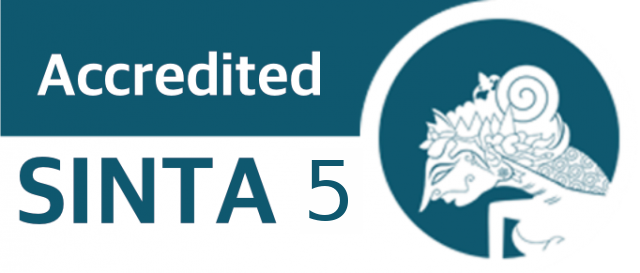Pendampingan Penguasaan Bahasa Inggris Siswa Sekolah Dasar Melalui Game-Based Learning (GBL)
Abstract
In this modern era, English is an international language that must be mastered by all people. In the world of education, English is introduced from an early age through various methods. However, not all schools are able to apply effective learning methods according to the level and characteristics of students. As is the case in Dateng Village, Laren sub-district, the teaching and learning process in several elementary schools is still very ineffective, especially in learning English. Ineffectiveness has an impact on students' motivation and enthusiasm for learning. One of the factors is the lack of fun learning methods. Therefore, the selection of media needs to be considered before learning activities. In this teaching and learning the Community Service team uses the Englsih for Young Learners theory approach with media suitable for elementary level students, namely through games to develop English vocabulary.. This media focuses on listening, listening, and speaking skills. The purpose of learning English is to increase students' enthusiasm in learning English and improve English language skills that are more effective and fun. The results of community service are 1. Interest and ability of students in learning English is increased 2. Basic abilities, especially in English vocabulary are more varied
Downloads
References
Aedi, N. & Amaliyah, N. (2017). Manajemen Kurikulum Sekolah. Gosyen Publisying: Yogyakarta
Aisyatin, Noviani. (2014). Games as Warming Up Activities in Young Learner’s Classrooms at an English Course. Journal of English and Education, 2(1), 49-55
Ali, S.N,. (2021). Pelatihan Bahasa Inggris Komunikatif dengan Menggunakan Metode Role Play bagi Anak Sekolah Dasar. Gorontalo: Universitas Negeri Gorontalo
Arsyad, A. (2011). Media Pembelajara. Jakarta: PT Raja Grafindo Persada.
Astuti, I. D., Dasmo, D., & Sumarni, R. A. (2018). Pengembangan Media Pembelajaran Berbasis Android Dengan Menggunakan Aplikasi Appypie di SMK Bina Mandiri Depok. Jurnal Pengabdian Kepada Masyarakat, 24 (2), 695-701
Bakhsh. (2016). Using Games as a Tool in Teaching Vocabulary to Young Learners. Canadian Center of Science and Education, 9 (7), 120-128
Brown, H. Douglas. (2007). Principle of Language Learning and Teaching. New Jarsey: Prentice Hall Regent
Depdiknas. (2006). Kurikulum Tingkat Satuan Pendidikan. Jakarta: Depdiknas
Elsheikh, A. (2018). Rubrics. The TESOL Encyclopedia of English Language Teaching. DOI: 10.1002/9781118784235.eelt0368.
Fatima, W,. dkk. (2019). Pembelajaran Bahasa Inggris Melalui Media Game Pada Pantia Asuhan Al-Maun di Desa Ngajum. Seminar Nasional Sistem Informasi, (SENASIF). 3 (1) 1725-1739
Hung, Cheng-Yu, Sun, JC., & Jia-Yin Liu. (2018). Effect of Flipped Classroom Integrated with MOOCs and Game-Based Learning on the Learning Motivation and Outcomes of Students from Different Backgrounds. Routledge. DOI: 10.1080/10494820.2018.1481103
Juliana. (2017). Motivasi Pembelajaran dan Percakapan Bahasa Inggris Melalui Media Film dengan Metode Dubbing dan Subtitling. Medan: Universitas Potensi Utama
Karagiorgas, D.N. & Shari N. (2017). Gamification and Game-Based Learning. Journal of Educational Technology Systems. Vol 45 (4). 499-519
Laufer, Batia. (2017). From Word Parts to Full Texts: Searching for Effective Method of Vocabulary Learning. SAGE. Vol. 21 (I), 5-11.
Muttaqien, F. (2017). Penggunaan Media Audio-Visual dan Aktivitas Belajar Dalam Meningkatkan Hasil Belajar Vocabulary Siswa Dalam Mata Pelajaran Bahasa Inggris Kelas X (Quasi Experiment : SMAN 8 Garut). Jurnal Wawasan Ilmiah, 8 (1)
Pellas, N., Panagiotis, F., Ioannis K., David W. (2018). Augmenting the Learning Experience in Primary and Secondary School Education: A Systematic Review of Recent Trends in Augmented Reality Game-Based Learning. Springer. 329-346.
Purwani, W.A. (2021). Learning Method Using Communicative Approaches to English Grammar Teaching. Jurnal Bidang Kependidikan, Pembelajaran dan Pengembangan. Vol. 01 (3). 1-6.
Purwani, W.A. & Dewi, A.R., (2021). The Development of Lesson Plan Using Blended Learning Model at the University of Billfath. Teaching of English Language and Literature Journal. Vol. 9 (2), 112-120.
Sukiman, W.A., Purwani, Y., Pratiwi, N., Widiati. (2019). The Use of Samawa Tribe Sakeco Art as a Literature Learning Material in Junior High School. Journal of Physics. Doi: 10.1088/1742-6596/1339/1/012076/
Taseman, Wilujeng A.P. (2020). Meeting Standards through Integrated Curriculum: Point of View by Susan M. Drake and Rebecca C. Bruns. International Journal of Recent Educational Research. Vol. 01 (01), 1-18
Tomlinson, Brian. (2011). Developing Principled Materials for Young Learners of English as a Foreign Language. Teaching English to Young Learners. UK: Leeds Met University.


.png)

.png)




.png)
.png)


